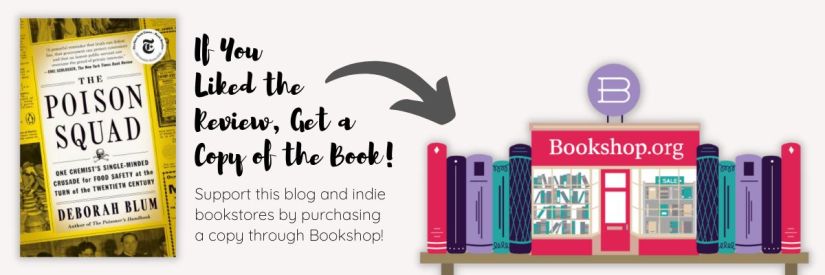One Chemist’s Single-Minded Crusade for Food Safety at the Turn of the Twentieth Century
‘Tis the last Nonfiction Book Club book of the year, as recommended by a former coworker to the group. Next year, 2020, all book club selections will have been voted on by the group as a whole.
Synopsis
From the Back Cover:
Near the end of the nineteenth century, food was dangerous – lethal, even. Milk and meat were routinely preserved with formaldehyde, and rancid butter was made edible with borax, best known as a cleaning product. Unchecked by regulation, food manufacturers put profit before the health of their customers. Then in 1883, Dr. Harvey Washington Wiley was named chief chemist of the United States Department of Agriculture, and he began to campaign tirelessly for food safety and consumer protection. Deborah Blum brings to life this hugely satisfying David and Goliath tale, driving home the moral imperative of confronting corporate greed, which speaks resoundingly to the enormous social and political challenges we face today.

Review
This review is both reflection on this particular book, as well as a reflection of this year, the first of my new nonfiction book club. After spending most of last year reading nonfiction much more than fiction, and my previous book club imploding, I missed the camaraderie book clubs offer. I love having a group of people to talk about books with – people who read things differently than I do, who have different opinions, different backgrounds, different everything that enriches our conversations at book club.
It threw me for a loop when one of the women at book club this week said she wasn’t sure there would be as much to talk about with nonfiction as their is with fiction and I was tremendously confused. As much as I have enjoyed fiction books of all flavors over the years, I feel real life, from memoirs, to science books, and everything in between, has much more to offer a book club than fiction. But that could be my new inherent bias – are any readers in book clubs that read both? What would you say offers a richer conversation?
But on to The Poison Squad! This book came recommended to the group by a former coworker at the book store (and my friend), and she sold so many copies of the book to customers that I had to know what it was about the book she loved so much. While the synopsis does a pretty good job of hooking a potential reader in, my favorite parts of the book involved the more biographical aspects of the story – the focus on Wiley’s own life, particularly the way he treats the employees of the Department of Chemistry, and notably the secretaries.
Whenever any of his many antagonists, from the Secretary to the President, come after him, the staff of the chemistry department are always quick to support him, because he has always shown them all kindness and compassion, helped them with their work, and been an approachable and friendly human being. He endeared himself to all the women of the Gilded Age, aligning himself with suffragettes and the temperance movement (and also the makers of straight whisky), and the entire Heinz enterprise. His many allies made by defending pure food joined him in his political and congressional fight for legislation to support pure food and food safety standards.
Overall, The Poison Squad is a well written and terrifying look at what Americans used to be offered as a food substance that frequently did not include any actual food products. While there is still a certain amount of unknown in what we eat today, at least we have more information and can rest comfortably assured that our produce is fresh, our milk is free of formaldehyde, and the ingredient label is (mostly) accurate.
Rating: 8 out of 10 stars



I haven’t read this one but I absolutely loved another of her books, The Poisoner’s Handbook. It was incredible, so I’d definitely like to get to this one at some point! Also this: “It threw me for a loop when one of the women at book club this week said she wasn’t sure there would be as much to talk about with nonfiction as their is with fiction and I was tremendously confused.” Ugh. I feel like there’s still such bias against nonfiction as not being literary or fun to read or whatever it is people have in mind against it, I really don’t understand why. I love that you organized a nonfiction book club, I hope it helped change some of that perception!
LikeLike
Thankfully the woman who said it had changed her mind by the end of the meeting – I’ll add the Poisoner’s Handbook to my TBR pile!
LikeLiked by 1 person